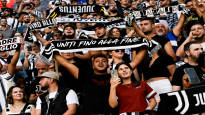On Thursday, the Court of Justice of the European Union published a decision that shook European sports circles.
According to the court, the International Football Association Fifa and the European Football Association Uefa broke the law when they canceled the Super League project of the big clubs.
Barcelona, Real Madrid, Juventus and nine other major clubs announced in 2021 that they would establish a new league, the Superliga. The clubs counted on the fact that the league would bring them a lot of spectator and advertising income.
The giant clubs’ plan drew strong criticism. Fifa and Uefa threatened to ban the clubs from the national leagues and ban those playing in the Superliga from entering the EC and World Cups. The Super League was put on hold, but Real Madrid, Barcelona and Juventus complained about the activities of the umbrella organizations.
On Thursday, the EU court announced that Fifa and Uefa have abused their position and violated EU competition law.
The verdict came as a shock to umbrella organizations. According to many experts, the court’s decision will change not only football but also the whole of European sports.
“The decision concerns the discretion of Fifa and UEFA”
In practice, the EU court ruled that Fifa and Uefa, which have controlled the football market to their heart’s content, cannot prevent the creation of private leagues.
CEO of A22, the Superliiga’s background company Bernd Reichart declared that “football is now liberated”. According to Reichart, the Superliga will be brought back as soon as possible, as long as the trust of the clubs and supporters has been won.
A researcher familiar with European legislation Antoine Duval stated however message service in Xthat the decision was not as successful for Superliiga as the supporters of the series let it be understood.
A couple of years ago, the new league received a complete shock from the supporters. After the decision of the EU court, many clubs such as Manchester United and Manchester City assured, that I am not interested in playing in the Super League.
– The decision of the EU Court should not be interpreted as supporting the Superliiga, on the contrary. The decision concerns the hypocrisy and arbitrariness of Fifa and UEFA, Duval wrote.
– The implementation of the Superliga depends on the will of the fans. If we oppose it, it won’t take off, the researcher continued.
Also Urheilu’s football expert Antti Pohja believes that supporters will have power in the future.
– I understand well the resentment towards international football associations. They have not really been value leaders. The positions of power are changing, but it is still decisive what the supporters think about these issues. Without fans, there is no sport. That’s why the big clubs have to be careful what they do in the future.
The gates are open for massive change
On Thursday, the EU Court issued a decision on two other sports cases. According to the court, the Belgian Football Association and the International Skating Union ISU acted contrary to competition legislation.
The Belgian Football Association demanded that the clubs must have a certain number of their own youth players. The ISU, on the other hand, threatened two Dutch speed skaters with a lifetime ban when they were participating in a competition event of a private Korean company.
The chairman of the Swedish Sports Confederation Anna Iwarsson according to the guidelines of the EU Court are revolutionizing European sports.
An experienced sports lawyer agrees Olli Rauste.
– The decisions open the gates for Europe to switch to the North American model at some point in time. It won’t happen in an instant, but I believe that in ten years the biggest leagues in Europe will be operated by private businessmen or women, Rauste estimates.
In North America, sports leagues like the NHL and NBA are the business of private operators. The task of sports federations is, among other things, to run national team activities, organize prestigious competitions and send teams to them.
The difference is significant compared to the European model, where sports associations have traditionally monitored and regulated the competition. With the decision of the EU Court, private players who are interested in television, advertising and other incomes offered by sports can now enter the market.
According to Rauste, the setting has good and not so good aspects.
– In the current situation, the sports federations have managed TV rights and advertising income. Part of this income has been channeled into grassroots work for smaller clubs. The downside has been that the sports federations have had so-called loose money at their disposal, which has been drawn on. When we move to a market economy model, that loose money and the corruption of big unions will decrease, says Rauste.
If the European sports model is reinvented, the distribution of income will also change. Rauste predicts that successful and interesting clubs like Real Madrid and Barcelona would become even richer. Instead, the financial gap between the giants and smaller clubs would grow.
There are still countless open questions, and answers will not come quickly. Rauste believes that different sports are now intensively researching how the Competition Series should be organized in the future.
There is still a lot of discussion about the Football Super League. Former professional player Antti Pohja hopes that in the midst of the money hunt, the big clubs would remember their roots.
– The club always comes from somewhere. Barcelona or Real Madrid may have a billion fans in Japan, but they would be nothing without their local community. If the club’s support close by disappears, there is nothing left.
